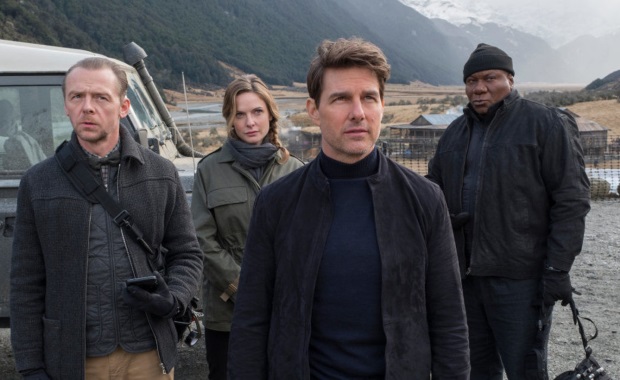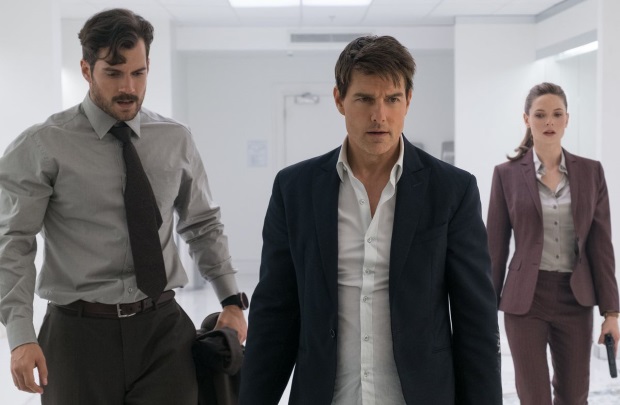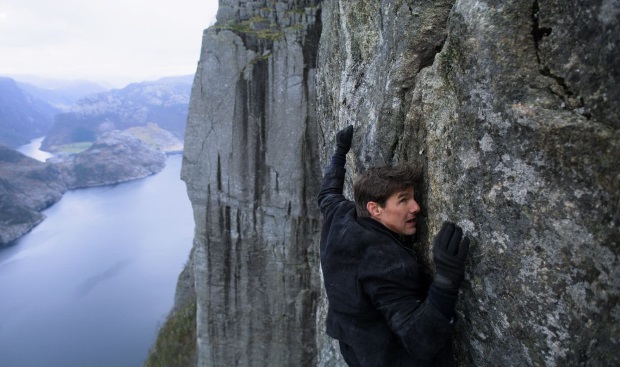Christopher McQuarrie interview: Mission Impossible: Fallout
Christopher McQuarrie chats to us about long movies, directing Mission: Impossible 6, Tom Cruise and The French Connection...
This summer sees the release of Mission Impossible: Fallout, the sixth entry in the franchise. Christopher McQuarrie, as well as being a writer and producer on the previous movies, is the first director to return. We sat down with him to discuss the franchise’s staying power, whether audiences really care about running times, and Tom Cruise’s supernatural gift for looking young.
[NOTE: We talk around some of the twists in the movie. They might not technically be spoilers, but there’s a section we’ve marked, just to be on the safe side…!]
Now before we get into anything, I just have to tell you face to face – I think Edge Of Tomorrow is fantastic. Probably the most perfectly-executed action movie I’ve seen since Terminator 2. It gets better every time I see it.
Thanks so much! We’re working on a sequel in fits and starts. I had such a great experience on that movie, I really hope we can get the sequel made.
Now, just to clunkily swing it around to the actual reason we’re here… Mission Impossible has now been going on longer as a film franchise than the TV series. Why do you think it resonates with people, and specifically, how does it resonate with you?
I think what brings other people around to it again and again is the element of wish fulfilment in these movies – Ethan isn’t a superhero, but he’s imbued with superpower provided by technology. I know I can’t be Thor or Captain Marvel, but if you gave me the invisibility screen I could be Ethan Hunt. In every movie he has a new power – in the first film he levitates, in Brad’s film he’s Spider-Man, in Rogue Nation he’s Aquaman – but in every instance it’s just this side of real. I think that’s a big part of it.
My way in is just that I grew up watching it in syndication – it was my TV comfort food! My memories of it are specifically lazy late afternoons watching re-runs at the age where you’re blissfully unaware of concerns about production values and plausibility. It had such a fun style that I can’t resist.
Actually thinking of your personal connection to the material, I feel like I noticed a lot of nods to the great canon of action movies – was that a way to keep things fun for yourself?
Funny enough, I’d say that (McQuarrie’s previous movie) Mission Impossible: Rogue Nation is loaded with conscious nods to other movies, and this one – if they’re there they’re unconscious. I was trying not to be overt! I thought I was only putting in one reference to one previous MI movie, but people are seeing a lot so I guess it’s permeated my DNA. The only conscious nod involved Vanessa Kirby’s character, so if anyone spots it, that’s the one!

I know our reviewer, Ryan Lambie, was very keen on the French Connection feeling that the middle set piece of the movie has.
Oh for sure, it’s kind of unavoidable if you have a car racing underneath an elevated train it’s going to the look like The French Connection! Where that comes from is that I’ve gotten to know (director) William Friedkin over the last few years and I interviewed him at a screening at the Academy to celebrate the 35th anniversary. I learned how it was that he shot that sequence and how it’s so impossible to replicate and it really boils down to the fact that a lot of what they did was illegal! And that’s why nobody can do it again!
So yeah, I was determined to push for some of that feeling, the off-the-rails madness of that chase. I admit it does end up looking like The French Connection for that reason. Although what I’m really gunning for is To Live And Die In LA. That’s shockingly resilient. The stakes of those action sequences are much better than anything else.
The following question is mildly spoiler-y. Scroll past the next picture if you don’t want to read it. But on the flip side, we don’t really give anything away.
There are some big, well-executed plot moments in this movie – and forgive me for being vague because I’m going to try and talk around them – but I’m interested in how you craft that kind of reveal for an audience that’s increasingly genre-savvy, and goes into films looking for these twists.
The twists that are in the story – there’s a [REDACTED] – and that’s actually where I started writing the movie. It dictated the emotional arc for the characters involved. And then the other twist, the [REDACTED], came about more organically. I actually had a different scene there originally. The movie began as an exploration of Ethan’s darker side – he assumes the role of John Lark and has to convince people that he is this terrorist character. Throughout the movie you wonder, is he playing a role or is he giving in to his darker nature after so long? Is he enjoying this?
So that’s where the movie started, and it was taking me down a path to a really dark scene, that Tom really embraced – he pitched something darker, even! But I found myself forcing the narrative towards it even though the movie just didn’t want to go there. I was really struggling with it – and then Tom broke his ankle. And we shut the movie down and I was able to really confront the material, realise why it wasn’t working, and address it.
From that, emerged the middle part of the movie. The big twist arrived organically. This is working because I’m not trying to make it work. And even if it’s predictable, it’s fun to watch, so I didn’t worry about people seeing it coming so much as was it rewarding when it arrived? I was very lucky that everybody bought a bit of invention to that scene – it was just great fun, everyone’s performing at the top of their game.

The dynamic between Cruise and Cavill is great too – he’s this CIA douchebag and Tom’s our hero, but you’re never quite sure which way either of them is going to go in any given moment because they’re both butting off one another, it’s an unpredictable dynamic. You must have felt really glad to find that chemistry between them.
I knew when I met Henry from his sense of humour that he had a dark side that hadn’t been explored, and I knew I could make it believable that this guy could be trouble. I wanted someone who was physically imposing too, so that if there was ever a conflict between them he’s gonna beat the living shit out of Ethan! Tom is fortunately the kind of star who isn’t afraid to look vulnerable or get his ass beat. He understands that’s all part of making an empathetic character, the only other person who understood that was Harrison Ford. Indiana Jones does amazing stuff, but it hurts! He pays the price for it!
What Tom was adamant about is that the tone of the relationship shouldn’t be such that they look like they’re gonna be buddies. He didn’t want them to think this guy was a replacement for (Jeremy Renner’s) Brandt. But when we were testing the movie there’s a key moment where Henry’s character seems to reveal some darker intentions – it’s quite overt – everyone was saying “Henry’s character is too predictable” and they say “well, the scene where he does X makes it clear what’s going to happen” and we were like… “well yeah – that’s not a secret, that’s us telling you!”
But as you say, people are so genre savvy that they’re trying to outsmart the movie and we felt them in those screening trying to outthink it. The ju-jitsu of that is that they’re so focused on the twists that they think they’re about to see that they don’t see the other one coming. That’s a very valuable lesson for future Mission Impossible movies – the audience is trying to outsmart you.
The strength of the twist in The Usual Suspects is the same – it comes from your understanding of storytelling. I didn’t outsmart anybody with that script, people outsmarted themselves. The answer is so obvious but you’re trying to stay one step ahead because you think it’s too obvious.
Since we’re talking about audience perceptions, I’d like to ask about the film’s running time, if you’re up for that?
Go for it.
So we hear a lot of talk right now that blockbuster movies are becoming too long, that they’re too padded, and I have to admit when I was told this screening was 147 minutes long I had that reaction of “oh god, I’d better bring a pillow” – but then when I was watching the film, I didn’t feel it sag, I didn’t get bored.
So what I think is that people, myself included, don’t actually mind long running times, and when they complain that movies are too long they’re actually not recognising the real problems, which is that they’re badly structured, or badly paced, or narratively confusing. So do you think people actually want shorter movies, or do they want something else that they can’t necessarily articulate?
No, you’re definitely right. Tom and I talk about this constantly with (editor) Eddie Hamilton. It always boils down to the same thing: people don’t care how long the movie is, just how long it feels. When we were testing it there were versions that were just a minute longer, but people were saying scenes were too long – too much car chase, too much of the helicopter sequence – we found that somewhat shocking, because no point did anyone say that the dialogue scenes were too long, or that there was too much talking. So we knew that the story was there, but that people get just as exhausted from concentrating on action as on drama.
What we were conscious of was that the one place we could afford some padding was the start of the movie, the set up of the film. Normally these films open with a big, jaw-dropping sequence that’ll grab you by the neck and shake the change out of your pocket. I said to Tom right from the beginning, I’m not starting this movie with action. We’re gonna front-load the exposition, get all that shit out of the way, get the mission and backstory right up front, and we’ll have the big action sequence 20 minutes in.
Tom embraced that, which is a real testament to him as a filmmaker. There were things he wanted in the story and I kept saying “Okay, but that’s gotta go at the beginning!” and he was like “Fine!”. He doesn’t tell me to put scenes in, he wants me to create the right feelings. That “mission gone wrong” at the start of the movie – I wanted it to be like 30 seconds long, but it kept getting bigger and bigger, and he watched it and he told me “You know what, I don’t feel the team here. We can’t count on anyone having seen a Mission Impossible movie, we need some interaction between the team.” and he was right, so we added even more to that scene.
So I was very nervous at how long the beginning was becoming, because the one thing that all of my movies have in common is that the first act is just long. I’m frontloading stuff so that the movie can begin to pay off at the 30 minute mark, and despite trying to avoid that… here I was yet again doing that!

It’s interesting that Tom has that intuition – in recent years people have been calling him the last great movie star that we’ll ever see, at least until the industry changes substantially. Do you think the decline of this movie star model means it’s harder to get projects made?
Certain kinds of projects, definitely. I’ve met with other actors and talked about other vehicles, and compared to Tom – they simply don’t have the breadth of knowledge in terms of cinematic storytelling, and what they must sacrifice to tell a good story. Everybody looks at the stunts and the physical danger that he does, but also the vulnerability he shows, the fun of himself that he’s willing to make. The power he gives to the cast around him. That’s what makes him a star. The reason he’s lasted is because he’s incredibly disciplined in storytelling and what he shares of himself. It’s not just genetics – he’s also supernaturally managed to stay looking young. The joke is that y’know, I had dark hair when I met Tom and now I’m grey and old – I’m like the portrait to his Dorian Gray.
You know, I see guys coming up who have the opportunity to be that kind of star, but what they need to do is understand filmmaking. Gregory Peck knew, Charlton Heston knew. Margot Robbie is someone I think has that – she’s very shrewd and talented, she’s smartly taking control of the producing of her movies and legitimately understands how to tell those stories. There are plenty of actors who could do that, they just have to be willing to.
This is the first time a director has come back to the franchise – do you see yourself coming back to direct again, would you be happy to just come back and write, or is this it?
I’m always happy to come back as writer – I’m not one of those guys who makes the transition to directing and then it’s all I want to do. I’m very happy with a role in some form of collaboration. I’ll turn around tomorrow and write, or produce, or edit for another director. As long as I have an escape hatch. Not having the obligation to be in that role forever.
But in terms of the next Mission Impossible – well, at the end of the last movie I said “I really feel sorry for the guy who has to make the next one! Because what’s left?” and after this one… the level of expectation is so high that it’s too daunting to even contemplate right now. I’m going to wait until the smoke clears before I even think about that.
Christopher McQuarrie, thank you very much!
Mission: Impossible – Fallout arrives in cinemas on Friday